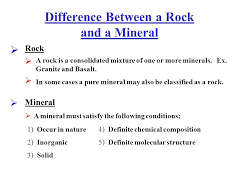Difference between Minerals and Rocks in tabular form

Minerals and rocks are related, but they are not synonymous. A rock is a solid material made up of crystals of one or more minerals. A mineral is a natural substance with a crystalline structure with a defined chemical composition. keep reading…
Rocks
Geology calls each solid material formed by crystals or grains of one or more minerals as a rock. It forms the solid part of the Earth and other planets. On our planet, the mantle and crust are made up of rocks. Rocks are formed by various processes known as petrogenetic processes in a closed cycle known as the rock cycle, where even living beings intervene.
They are generally made up of a heterogeneous mixture of various minerals. They are hard materials, but they can also be soft like clay or sand rocks. They can be classified according to their properties, their permeability, and their texture. However, the most used criterion is their origin under which they are classified as: Igneous, sedimentary, and metamorphic.
Minerals
A mineral is a natural substance with a defined chemical composition, solid and inorganic with a crystalline structure. The exact definition is still up for debate. The study of minerals is known as mineralogy. There are 5,300 known types of minerals, of which 5,070 are approved by the International Mineralogical Association (IMA). The diversity of minerals is controlled by the chemistry of the earth. Minerals are distinguished by having various chemical and physical properties, different chemical composition, and crystalline structure. suggested video: Minerals vs Rocks
Differences between Minerals and Rocks
- Rocks are solid or soft materials whose composition contains minerals.
- The minerals that make up rock are classified into essential minerals (they form almost completely the rock and are the most abundant) and accessory minerals (they represent only 5% of the volume of the rock and may be completely absent)
- A mineral is a substance of natural origin represented by a chemical formula, stable at room temperature, of ordered atomic composition, and of abiological origin (the latter is still debated)